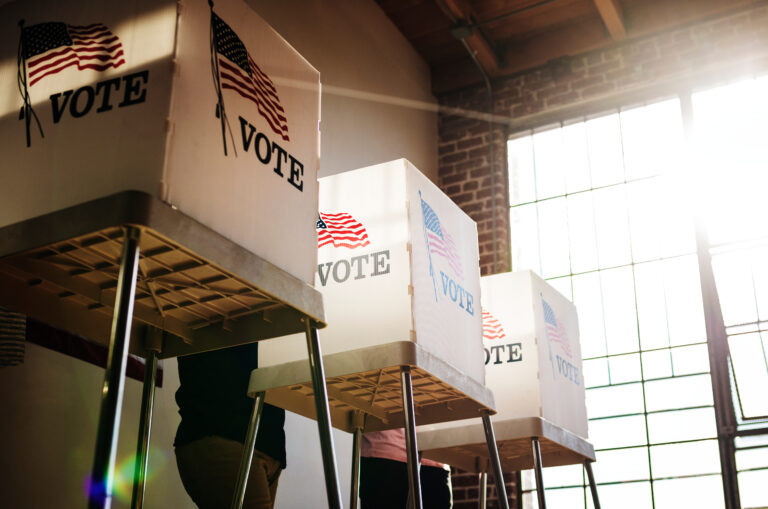Penn CERL report detailing findings from a two-part tabletop exercise urges preparedness amid threats to election security
The Center for Ethics and the Rule of Law (CERL) at the University of Pennsylvania published today an after action report summarizing key takeaways from two tabletop exercises assessing the risk of civil unrest surrounding the 2024 presidential election. Political leaders must be prepared to intervene vigorously in the face of threats to the rule of law as well as attempts to disrupt the certification of election results, the report cautions.
More than three dozen high-ranking military, national security, and election experts as well as current and past officials in state and local government and civil society leaders gathered on two occasions to simulate scenarios relating to the certification of the election and inauguration-related threats to the peaceful transition of power.
The first exercise modeled a situation in which there are allegations of voter fraud in Lancaster County, Pennsylvania, resulting in protests that spiral out of control, with local officials needing to regain law and order by closing polls. In the hypothetical scenario, Pennsylvania is delayed in certifying its election results, impacting the entire state and potentially the country.
The objective was to identify vulnerabilities in the election administration process and to develop strategies to safeguard U.S. elections against domestic violent extremism and disinformation.
The second exercise simulated a scenario in which a newly elected President issues illegal orders for the Pennsylvania National Guard to quell protests across Philadelphia, with a goal of identifying vulnerabilities in the military’s chain of command and developing strategies to ensure that military responses to illegal orders align with democratic values.
“It is critical to be particularly vigilant with regard to threats to the rule of law during moments of transition in a democracy, such as elections and the first days of a new administration,” said Professor Claire Finkelstein, faculty director of CERL. “It is also critical to ensure that attempts to quell unrest, which could involve deployment of the U.S. military, adhere strictly to the law, which sharply limits use of the military for domestic law enforcement purposes. Our exercise helped identify the legal boundaries of deployment of the military with regard to election security.”
The group warned that civil unrest on Election Day and in the aftermath through to Inauguration Day is a “realistic if not likely possibility,” concluding that federal, state, and local authorities are insufficiently prepared to counter threats to election security, including those relating to misuse of the military for civilian law enforcement purposes and the peaceful transition of power.
“Right now, people are saying that our election will be stolen, that it’s rigged, the numbers will be false, and that they need to do something about it,” said former Congressman Mickey Edwards (R-OK), who participated in the exercise. “It’s essential that state and local officials are prepared for this kind of disinformation and the violence that could stem from it.”
In the face of an emergency, vulnerabilities may arise from unresolved points of law at a state and federal level that are unlikely to be resolved by the courts in time.
“Being aware of the potential for violence and damage to the institutions we rely upon is important,” said General (ret.) Joseph Votel, member of CERL’s Executive Board. “But it is insufficient in the face of legislative acts that are open to broad interpretation, strong political rhetoric that dominates the public information space, and imperfect individuals acting in accordance with their oaths.”
Highlights
Among the group’s findings and recommendations are:
- Factors such as disinformation by domestic or foreign actors and inadequate or inflated responses by law enforcement may combine with undecided election results for a protracted period to heighten the risk of political violence during or in the aftermath of the election.
- Law enforcement must prioritize the physical safety of voters at polls in at-risk locations nationwide.
- Dispelling disinformation will require whole-of-society efforts, including effective and transparent campaigns by state and local officials as well as community leaders to bolster public trust in the election and counter any unfounded allegations of fraud or fault.
- The legal authority of the President would likely supersede that of the Governor in disputes over control of the National Guard.
- The military should prepare for situations in which there are cases of patently illegal presidential orders in a new administration, attempts to deploy the military for ideological or political objectives, or presidential orders to combatant commanders that circumvent the Joint Chiefs and other Pentagon officials.
- In light of the Supreme Court’s immunity decision, state and local authorities would be wise to brace for instances of federal overreach in a new administration.
Related Papers & Articles
Ilya Rudyak, Marcus Ellinas, Joe Dangtran, David Glinbizzi, “Domestic Violent Extremism in the United States Military,” Center for Ethics and the Rule of Law, Oct. 11, 2023
Claire Finkelstein and Kevin Govern, “The deployment of federal agents in Portland is a harbinger of authoritarianism,” The Rule of Law Post, Jul. 24, 2020
Richard Pildes, “There Are Guardrails in Place to Avert Partisan Manipulation of the Election Outcome,” Lawfare, Oct. 18, 2024
Image: rawpixel.com/stock.adobe.com







